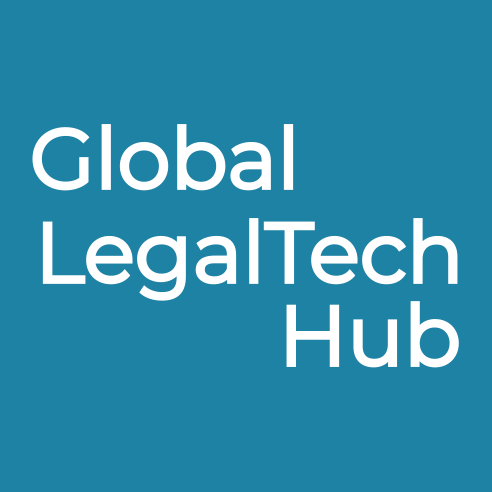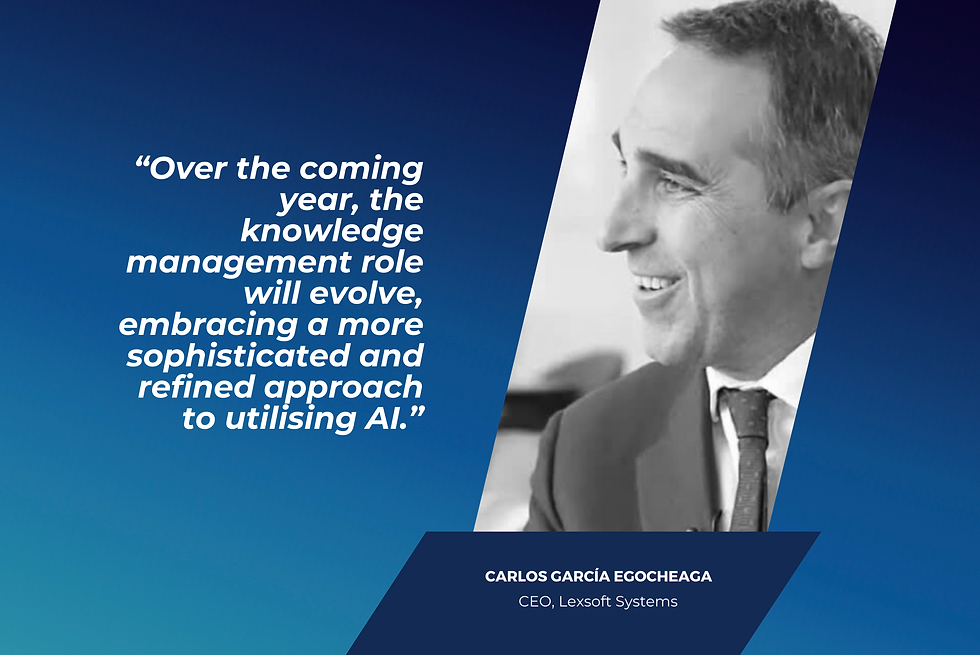Damien Riehl: “Everything will have legal tech”
- Nov 3, 2024
- 6 min read
Updated: Dec 19, 2024
By Pablo Yannone Sancho, Journalist at GLTH

When Damien grew up, he wanted to be Harry Connick Jr. and follow his musician career. It was when he was playing a Brahms piece that suddenly two of his tenors started punching each other in the face. And he thought: “Do I really want to be a teacher? What if I go to law school?”
Well, he did so. And now he has a long professional trajectory combining law and technology. He spent about 15 years litigating with the major firm Robins Kaplan, worked at Thomson Reuters and Facebook, and, for the past five years, he’s been with vLex, where he runs billions of legal documents from many countries across LLMs. All these experiences have provided him a very interesting insight into the legal technology sector. Do you want to know more?
Against all odds, there is 1% of innovation within the processes of law firms
Damien has a very reflective attitude when it comes to defining legaltech: “I would say that it's hard to say that it's one thing because legal technology is going to be used for every single aspect of legal work.”
He focuses a lot on LLM, as this technology can do “every single thing that we as lawyers do”: ingest words, think about words, and output words. And so what is legaltech? “It's everything we do, because everything that we do is going to be, going forward, using these Large Language Models.”
Of course, Damien is talking about the future, as right now it could be said that there is still a lower implementation of AI. According to him, one reason is that lawyers always look to precedent: “We look to what's been done before. And if it's precedential, whether it's a case or something else, then it's probably going to apply to this.”
Regarding this, Damien considers that the most common technologies nowadays are yesterday's technologies, such as Microsoft Word. “If you're lucky, people know Microsoft Excel,” Damien says. “There was a joke when I worked for the courts that they said the courts have yesterday's technology tomorrow. So in the same way, I think law firms often have yesterday's technology, and maybe they'll get it tomorrow. And there are already many skills related to those technologies that have to be learned.”
Although it is believed that many law firms are being innovative, there is just a “1% of innovation within their processes,” and the rest just respond to an intention of “making their clients think that they're being innovative.” “Yes, there is innovation going on within law firms,” claims Damien. “But if you get in the hush tones and get people one on one, often there is a very different view of what's innovative.”
So, for those who have already managed yesterday’s skills, what technologies should they have inside their work? Damien is very clear about it: Large Language Models. “They are transformative, they've ingested every single book that has ever been written and the entirety of the internet.” And, in terms of law, LLM also has access to “the entirety of the legal sphere.”
Despite his previous point of view about innovation, Damien thinks that law firms are doing better with LLM. But maybe not better enough… “They are just dipping toes into the water, when they should be jumping in with both hands and feet”, he claims.
The odyssey of the benchmarks
All companies are reporting which AI tool fits better with them, a hasty race that involves GPT-4.0, “which is the current state of the art,” Anthropics' Claude, and Google's Gemini. A fourth tool is Meta's Llama. It used to be less competitive until it became open source “and is now also neck and neck”, assures Damien.
Of course, if there is a war within benchmarks, it is because law firms want to make a decision on only one, which, for Damien, is a huge mistake: “The models will continue getting better, and they will continue being a horse race. The best and smartest companies are doing an ensemble of models.” But depending on what? On tasks?
Actually, for Damien, it depends on how much reasoning that task requires. “Do you require a senior lawyer's kind of thinking about the case, or does it require just a junior analyst or a secretary's kind of work? So if it requires a senior lawyer, use the best model. If it only requires a secretary's work, then you could be able to save the money and use a lower model, which will then get the job done.”
Damien talks about companies that are not doing very well, but he has gone to many conferences worldwide where he could get to know others who are being successful in terms of LLM applications: Joe Green and John Scrudato, CIO at Gunderson Dettmer and Director of AI and Innovation at Latham & Watkins, who “are doing really cool things.” “Every time I hear Joe and John speak”, Damien says, “it's clear that they talk the talk and walk the walk, where others just kind of talk the talk. It's clear that Joe and John are really doing the right things with their firms.”
A little storytime about LLM
Damien was asked about his perception of the evolution of the legaltech ecosystem. He took “the long arc of that” and drew an interesting metaphor related to the current LLM applications: “In 1999, as a lawyer, I used email to transmit legal advice to my client, which could breach my duty of confidentiality. If somebody hacks one of those servers, they could be able to eavesdrop on what's being said. And email is not encrypted. And the thing is, everybody used it, and now it's not an ethical bar.”
To Damien, in the context of LLM, everybody's saying: “Oh, you're breaching your duty of confidentiality. And do you trust OpenAI? Are they going to be training the system? I'm not using a large language model because of that.” And, to Damien, this is as silly as saying: “I don't email my clients because of the duty of confidentiality.” The same has happened with eDiscovery, Cloud computing, etc. “We've seen this movie before.”
So, using LLM is almost mandatory for each law firm. Above all, when we take into account its several benefits. Damien shares this interesting piece of information: “92% of legal needs are unmet because we lawyers are too expensive.” To Damien, AI can help to provide Access to Justice to “each person in our countries.”
Damien also thinks that LLM could help to enhance the profession and salary of specific lawyers, like the following example shows: “The case of a defense lawyer in the past would just be dismissed because the person being discriminated against would do such a poor job representing themselves. But instead of the case being dismissed after a week, maybe the case stays in the pipeline for longer.”
The wave of LLM is a game changer, and Damien is bound to ride it as well as possible. The best recommendation that he can give you as a Legal Advisor is reflected here: “People often say, what do I need to be reading to be able to figure out how to use large language models? And that question is kind of like, what should I be reading to learn how to swim? And the answer is, nothing that you're reading is going to help you swim.” Are you riding the legal tech wave like you should?
Lawyer, coder, singer, and writer
Damien leads a very dynamic life, but he has not left one of his biggest passions: music. He is still playing guitar and singing. Indeed, he has a virtual choir that has members in six continents worldwide! “So I will sing the soprano, alto, tenor, bass, and then send out the recording,” he says. He has run it since the pandemic, encouraging many people to sing along with him and his music. This could be aligned with his everyday mantra: “To make the world a bit better each day.”
He is a person who prefers producing rather than consuming. When he reached about age 35, he could not watch a TV series without thinking about producing things. So he made the decision to watch a documentary instead: “At least, even though I'd be consuming things, it'd be consuming real-life things that I could use in being more productive.”
He leads all this passion also to writing. In fact, he writes all the time. He spent his last vacation producing different taxonomic items that are being used by Thomson Reuters, LexisNexis, iManage, and NetDocuments, and that have been translated into more than five languages!
He is very excited about legal technology as he thinks that “we are really entering the golden age” and he is looking forward to reaching out to more people. People who want to ride the wave of technology and generate knowledge around it. That is why he encourages you to join the Global LegalTech Hub and not miss any opportunity.
VP, Solutions Champion, vLex




Comments